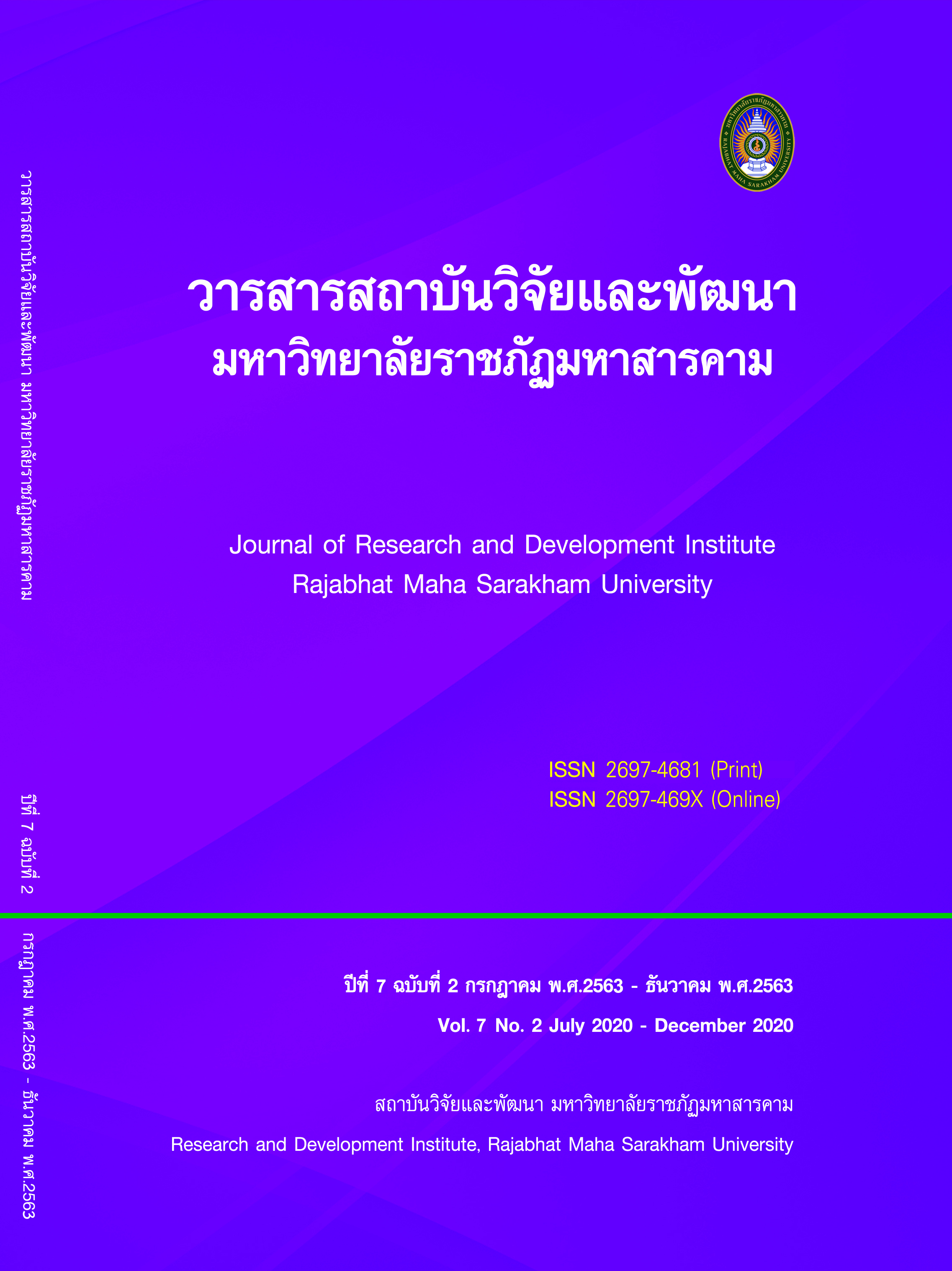Development of Chemistry learning and solving problem ability by conductivity 5E with STAD technique activity of Muttayomseuksa 5
Keywords:
inquiry activity 5E with STAD techniques, Achievement, Ability to think and solve Problems, SatisfactionAbstract
The objectives of this research were 1) to develop learning activities in chemistry. And the problem solving ability by using 5E inquiry learning activities together with STAD technique of mathayom suksa five students with efficiency according to 70/70 criteria. 2) Comparison of academic achievement. Using 5E inquiry learning activities together with STAD techniques with 70 % of the criteria. 3) Comparison of problem-solving ability By using 5E inquiry learning activities together with STAD techniques and 4) studying student satisfaction. Toward the learning activity management by using the inquiry learning activities. 5E with technical STAD samples. Use in research Mathayom Suksa 5 students , research tools , 1) learning management plan, 2) learning achievement test, 3) problem solving ability test, and 4) satisfaction questionnaire. The statistics used were mean, deviation. standard percentage and hypothesis testing by t-test (dependent sample).
Research results 1) The development of chemistry achievement And the ability to solve problems by using 5E inquiry learning activities together with STAD techniques with the effectiveness of 71.94 / 71.62 according to the specified criteria. 2) The achievement of The students who learned by using 5E inquiry learning activities together with the STAD technique after learning were higher than the criteria of 70 percent with statistical significance at the .05 level. 3) The problem solving ability of students by using learning activities. Knowing Quizzes 5E with STAD Techniques After Studying Higher Than Before With statistical significance at the level of .05 and 4) student satisfaction By using the 5E inquiry learning activity together with STAD technique , the overall average is 4.42 which is in the high level.
References
References
Anusart Sansri. (2011). Developing a plan for learning activities using collaborative learning activities techniques STAD, on the process of plant life, science learning group, grade 1. Master of Education Thesis: Mahasarakham University.
Banchong Amornchewin. (2013). Critical Thinking: Principles for the development of logical thinking and judgment. Bangkok: Prints.
Ministry of Education. (2008). Basic Education Core Curriculum 2008. Bangkok: Agricultural Cooperative Association of Thailand Printing House
Ministry of Education. (2017). Manual for the curriculum of basic science courses, science subject group (revised 2017) according to the core curriculum of basic education 2008, upper secondary level. Bangkok: Agricultural Cooperative Association of Thailand Printing House
Nuttama Suphachananan. (2011). Development of learning and teaching activities based on the 4 noble truths for developing thinking skill of Prathom Suksa 5 students, Tessaban 5 (Kaewpanayauppatham) School, Phayao Municipality, Phayao Province. Master of Education Independent Study: Chiang Mai University.
Patthinan Rattanapongphak. (2007). Development of learning activities through the process of searching for knowledge according to the 5-step learning cycle model, about food and living, Science learning subject group of Mathayom Suksa 2 students. Master of Education Thesis: Mahasarakham University.
Pornchai Khamsingnok (2007). Comparison of learning outcomes on quantitative calculations in chemical reactions in science subjects of Mathayomsuksa 4 during teaching using TGT and STAD techniques. Office of Academic Resources, Mahasarakham University.
Pranee Heepkaew. (2009). “The Development of Mathayomsuksa-3 Student, Problem Solving Ability and Learning Achievement in the Science Unit on Resources and Environment using Problem-Based Learning (PBL)”. KKU Res J (GS), 9 (1), 120-128.
Slavin, R.E. (1995). Cooperative Learning. New York: Longman,
Sukanya Songkor. (2012). Comparisons of Matthayomsuksa 4 Student Chemistry Achievement, Analytical Thinking and Attitude Between Who Learned by Using 7-E Learning Cycle and Cooperative Learning Activities Based on the Student Teams Achievement Division (STAD) Technique. Journal of Graduate School, Sakon Nakhon Rajabhat University, 9 (44), 213-221.
Suwit Moonkham and Arathai Moonkham. (2011). Methods of learning management to develop knowledge and skills. Bangkok: Printmaking Limited Partnership.
Tisana Khammani. (2013). Pedagogical Sciences: Knowledge for effective learning management. Bangkok: Chulalongkorn University.
Ummara Srikern. (2010). The development of Spelling Skill for Reading and Writing Thai Language of Prathom Suksa 1 Using Skill Pratice Coorerating with the Student Team Achievement Division Learning Activities. Master of Education Thesis: Maha Sarakham Rajabhat University.
Weir. (1974). Organization Behavior in Education. 5th ed. Boston: Allyn and Bacon.
Downloads
Published
How to Cite
Issue
Section
License
Articles that are published are copyrighted by the authors of the articles







